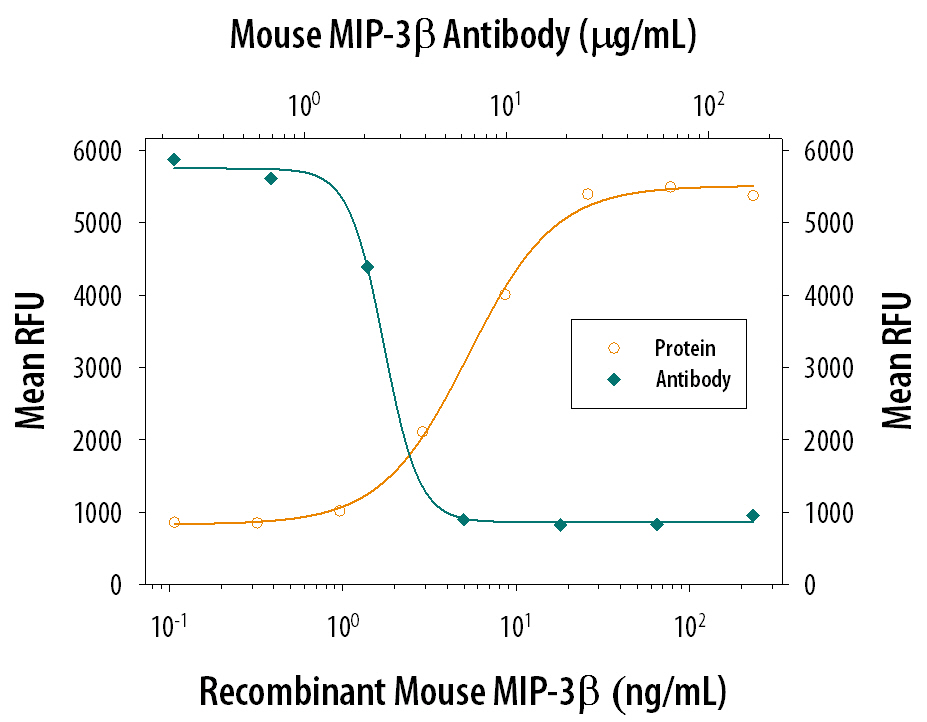Mouse CCL19/MIP-3 beta Antibody Summary
Gly26-Val107-Leu-Glu (Ser108LeuGlu)
Accession # Q548P0
Applications
under non-reducing conditions only
Mouse CCL19/MIP-3 beta Sandwich Immunoassay
Please Note: Optimal dilutions should be determined by each laboratory for each application. General Protocols are available in the Technical Information section on our website.
Scientific Data
 View Larger
View Larger
Chemotaxis Induced by CCL19/MIP‑3 beta and Neutral-ization by Mouse CCL19/MIP‑3 beta Antibody. Recombinant Mouse CCL19/ MIP-3 beta (Catalog # 440-M3) chemoattracts the BaF3 mouse pro-B cell line transfected with human CCR7 in a dose-dependent manner (orange line). The amount of cells that migrated through to the lower chemotaxis chamber was measured by Resazurin (Catalog # AR002). Chemotaxis elicited by Recombinant Mouse CCL19/MIP-3 beta (50 ng/mL) is neutralized (green line) by increasing concentrations of Rat Anti-Mouse CCL19/ MIP-3 beta Monoclonal Antibody (Catalog # MAB880). The ND50 is typically 3-15 µg/mL.
Reconstitution Calculator
Preparation and Storage
- 12 months from date of receipt, -20 to -70 °C as supplied.
- 1 month, 2 to 8 °C under sterile conditions after reconstitution.
- 6 months, -20 to -70 °C under sterile conditions after reconstitution.
Background: CCL19/MIP-3 beta
CCL19/MIP-3 beta, also known as ELC (EBI1-Ligand Chemokine), is a beta chemokine that binds specifically to the chemokine receptor CCR7/EBI-1/BLR-2. Mouse (human) CCL19 cDNA encodes a 108 (98) amino acid precursor protein with a predicted 25 (21) aa signal peptide that is cleaved to form the 83 (77) aa mature secreted protein. CCL19 is distantly related to other beta chemokines (20 - 30% aa sequence identity). Mouse CCL19 shares 83% aa sequence homology with human CCL19. CCL19 has been shown to be constitutively expressed in various lymphoid tissues (including thymus, lymph nodes, appendix, and spleen) in dendritic cells within the T-cell zone. The expression of CCL19 is down-regulated by the anti-inflammatory cytokine IL-10. Recombinant CCL19 has been shown to be chemotactic for T-cells and B-cells. The CCL19 receptor (CCR-7/EBI-1/BLR-2) is expressed in various lymphoid tissues and activated B and T lymphocytes. CCR7 is also strongly up‑regulated in B-cells infected with Epstein-Barr virus and T-cells infected with herpesvirus 6 or 7.
- Kim, C.H. et al. (1998) J. Immunol. 160:2418.
- Ngo, V.N. et al. (1998) J. Exp. Med. 188:181.
- Rossi, D.L. et al. (1997) J. Immunol. 158:1033.
- Yoshida, R. et al. (1997) J. Biol. Chem. 272:13803.
Product Datasheets
Citations for Mouse CCL19/MIP-3 beta Antibody
R&D Systems personnel manually curate a database that contains references using R&D Systems products. The data collected includes not only links to publications in PubMed, but also provides information about sample types, species, and experimental conditions.
2
Citations: Showing 1 - 2
Filter your results:
Filter by:
-
Regulation of inflammatory factors by double-stranded RNA receptors in breast cancer cells
Authors: A Venkatesh, H Nandigam, M Muccioli, M Singh, T Loftus, D Lewis, M Pate, F Benencia
Immunobiology, 2017-11-22;0(0):.
Species: Mouse
Sample Types: Cell Culture Supernates
Applications: ELISA Development (Capture) -
Thymic T cell development and progenitor localization depend on CCR7.
Authors: Misslitz A, Pabst O, Hintzen G, Ohl L, Kremmer E, Petrie HT, Forster R
J. Exp. Med., 2004-08-09;200(4):481-91.
Species: Mouse
Sample Types: Whole Tissue
Applications: IHC
FAQs
No product specific FAQs exist for this product, however you may
View all Antibody FAQsReviews for Mouse CCL19/MIP-3 beta Antibody
There are currently no reviews for this product. Be the first to review Mouse CCL19/MIP-3 beta Antibody and earn rewards!
Have you used Mouse CCL19/MIP-3 beta Antibody?
Submit a review and receive an Amazon gift card.
$25/€18/£15/$25CAN/¥75 Yuan/¥2500 Yen for a review with an image
$10/€7/£6/$10 CAD/¥70 Yuan/¥1110 Yen for a review without an image


